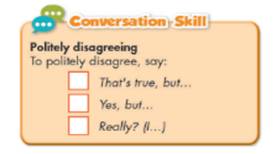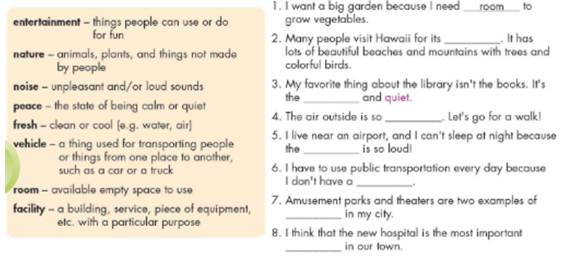Hãy nhập câu hỏi của bạn vào đây, nếu là tài khoản VIP, bạn sẽ được ưu tiên trả lời.

Hướng dẫn dịch:
Kĩ năng đàm thoại
Bắt đầu một cuộc nói chuyện điện thoại
Để bắt đầu cuộc trò chuyện qua điện thoại với người bạn biết, hãy nói
Xin chào, (Ethan). Dạo này thế nào rồi?
Này, thế nào rồi?

B. I have many hobbies, but I like swimming best. - 1
C. I think swimming is a great hobby. - 5
D. I started swimming when I was five years old. - 2
E. We go swimming at the pool near my house on the weekend. - 4
Hướng dẫn dịch:
A. Tôi luôn luôn đi bơi với bố tôi.
B. Tôi có nhiều sở thích nhưng tôi thích bơi lội nhất.
C. Tôi nghĩ bơi lội là một sở thích tuyệt vời.
D. Tôi bắt đầu bơi khi tôi năm tuổi.
E. Chúng tôi đi bơi ở hồ bơi gần nhà tôi vào cuối tuần.

Đáp án:
1. room | 2. nature | 3. peace | 4. fresh |
5. fresh | 6. vehicle | 7. entertainment | 8. facility |
Hướng dẫn dịch:
giải trí - những thứ mọi người có thể làm để vui vẻ
tự nhiên - động vật, thực vật và những thứ không làm ra từ con người
tiếng ồn - âm thanh khó chịu hoặc lớn
bình yên - trạng thái bình tính hoặc lặng yên
tươi - sạch hoặc mát (ví dụ: nước, không khí)
xe cộ - một thứ được sử dụng để vận chuyển người hoặc vật từ nơi này sang nơi khác, chẳng hạn như ô tô hoặc xe tải
phòng - có sẵn không gian trống để sử dụng
trang thiết bị - một tòa nhà, dịch vụ, thiết bị, v.v. với một mục đích cụ thể
1. Tôi muốn có một khu vườn lớn vì tôi cần chỗ để trồng rau.
2. Nhiều người đến thăm Hawaii vì tự nhiên của nó. Nó có rất nhiều bãi biển và núi đẹp với cây cối và các loài chim đầy màu sắc.
3. Điều tôi thích nhất về thư viện không phải là sách. Đó là yên bình và yên tĩnh.
4. Không khí bên ngoài thật trong lành. Chúng ta hãy đi dạo!
5. Tôi sống gần sân bay, và tôi không thể ngủ vào ban đêm vì tiếng ồn quá lớn!
6. Tôi phải sử dụng phương tiện giao thông công cộng hàng ngày vì tôi không có phương tiện đi lại.
7. Công viên giải trí và nhà hát là hai ví dụ về giải trí trong thành phố của tôi.
8. Tôi nghĩ rằng bệnh viện mới là cơ sở quan trọng nhất trong thị trấn của chúng tôi.

/sk/: scare, school, kiosk, skip, ask, skill, risky, sky
/sp/: spicy, especial, aspect, correspond, sparse, speech, specialty
còn lại là st nha


Đáp án:
1. Yes,but… (Đúng vậy, nhưng…)
2. Really? (I…) (Thật sao, tôi...)
3. That’s true, but… (Điều đó đúng, nhưng…)
Nội dung bài nghe:
Joe: Do you think it's better to live in the country or the city?
Mai: I think the country is better because there's lots of nature, I love trees and animals.
Joe: But life in the country is too boring. I like the entertainment in the city theaters.
Mai: Yes, but the city is too crowded and there's not enough room for all the people there.
Joe: I like lots of people, it's exciting for me the countries too quiet.
Mai: Really, I like peace and quiet. I think there's too much noise in the city.
Joe: Well I think there are enough facilities in the country, the city has better public transportation.
Mai: That's true but I prefer the country because there are too many vehicles in the city and they make the air dirty.
Joe: Okay you're right about that there's lots of fresh air in the country but I still think city life is best.
Hướng dẫn dịch:
Joe: Bạn nghĩ sống ở nông thôn hay thành phố tốt hơn?
Mai: Tôi nghĩ nông thôn tốt hơn vì có nhiều thiên nhiên, tôi yêu cây cối và động vật.
Joe:Nhưng cuộc sống ở nông thôn quá nhàm chán. Tôi thích giải trí ở các rạp hát thành phố.
Mai: Đúng vậy, nhưng thành phố quá đông đúc không có đủ chỗ cho tất cả mọi người ở đó.
Joe: Tôi thích nhiều người, điều đó thật thú vị đối với tôi, nông thôn quá yên tĩnh.
Mai: Thực sự, tôi thích hòa bình và yên tĩnh. Tôi nghĩ có quá nhiều tiếng ồn trong thành phố.
Joe: Tôi nghĩ có đủ cơ sở vật chất trong nông thôn con thành phố có phương tiện giao thông công cộng tốt hơn.
Mai: Điều đó đúng nhưng tôi thích ở nông thôn hơn vì có quá nhiều phương tiện trong thành phố khiến không khí trở nên bẩn.
Joe: Được rồi, bạn nói đúng về việc có nhiều không khí trong lành ở nông thôn nhưng tôi vẫn nghĩ cuộc sống ở thành phố là tốt nhất.

Tạm dịch:
Nick: Tin tốt cho chúng ta đây. Chúng ta sẽ có lưu trữ đám mây của trường nên chúng ta sẽ không phải cầm nhiều sách đến trường.
Mi: Tuyệt!
Nick: Và mình đã thắng giải nhất trong cuộc thi viết luận và có một cái máy tính bảng nên mình có để đọc sách từ lưu trữ đám mây của trường.
Mi: Chúc mừng cậu!

28. What does the writer actually say about pronouncing foreign languages?
A. Only a few people are really proficient.
B. No one is really an expert in the skill.
C. There aren't many people who are even fairly good.
D. There are a lot of people who are moderately proficient.
29. The writer argues that going about the problem of pronunciation in the wrong way is_______.
A. an obvious cause of not grasping the problem correctly
B. a fundamental consequence of not speaking well
C. a consequence of not grasping the problem correctly
D. not an obvious cause of speaking poorly
30. The underlined word “one” in the passage refers to_______.
A. skill
B. careful training
C. special kind
D. itself
31. The best way of learning to speak a foreign language, he suggests, is by_______.
A. picking it up naturally as a child
B. learning from a native speaker
C. not concentrating much on pronunciation
D. taking on systematic work
32. The underlined word “aspects” in the passage probably means_______.
A. pronunciations
B. parts
C. words
D. sentences
Read the following passage and mark the letter A, B, C, or D to indicate the correct answer to each of the questions.
Pronouncing a language is a skill. Ever}' normal person is an expert in the skill of pronouncing his own language; but few people are even moderately proficient at pronouncing foreign languages. There are many reasons for this, some obvious, some perhaps not so obvious. But I suggest that the fundamental reason why people in general do not speak foreign languages very well is that they fail to grasp the true nature of the problem of learning to pronounce, and consequently never set about tackling it in the right way. Too many people fail to realize that pronouncing a foreign language is a skill - one that needs careful training of a special kind, and one that cannot be acquired by just leaving it to take care of itself. I think even teachers of languages, while recognizing the importance of a good accent, tend to neglect, in their practical teaching, the branch of study concerned with speaking the language. So the first point I want to make is that English pronunciation must be taught; the teacher should be prepared to devote some of the lesson time to this, and should get the student to feel that here is a matter worthy of receiving his close attention. So, there should be occasions when other aspects of English, such as grammar or spelling, are allowed for the moment to take second place.
28. What does the writer actually say about pronouncing foreign languages?
A. Only a few people are really proficient.
B. No one is really an expert in the skill.
C. There aren't many people who are even fairly good.
D. There are a lot of people who are moderately proficient.
29. The writer argues that going about the problem of pronunciation in the wrong way is_______.
A. an obvious cause of not grasping the problem correctly
B. a fundamental consequence of not speaking well
C. a consequence of not grasping the problem correctly
D. not an obvious cause of speaking poorly
30. The underlined word “one” in the passage refers to_______.
A. skill
B. careful training
C. special kind
D. itself
31. The best way of learning to speak a foreign language, he suggests, is by_______.
A. picking it up naturally as a child
B. learning from a native speaker
C. not concentrating much on pronunciation
D. taking on systematic work
32. The underlined word “aspects” in the passage probably means_______.
A. pronunciations
B. parts
C. words
D. sentences





Hướng dẫn dịch:
Kỹ năng hội thoại
Không đồng ý một cách lịch sự
Để không đồng ý một cách lịch sự, hãy nói
· That's true, but... (Điều đó đúng, nhưng…)
· Yes, but... (Đúng vậy, nhưng…)
· Really? (I...) (Thật á?)